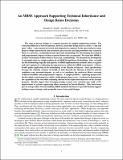| dc.contributor.author | Trujillo, Alejandro | |
| dc.contributor.author | De Weck, Olivier L. | |
| dc.contributor.author | Madni, Azad M. | |
| dc.date.accessioned | 2021-11-03T17:14:25Z | |
| dc.date.available | 2021-11-03T17:14:25Z | |
| dc.date.issued | 2020-11-02 | |
| dc.identifier.uri | https://hdl.handle.net/1721.1/137246 | |
| dc.description.abstract | © 2020 The MITRE Corporation. All Rights Reserved. The reuse of proven designs is a common practice in complex engineering systems. The contextual differences between missions, however, mean that design reuse is rarely a “copy and paste” effort – some amount of rework and adaptation is required. In the space industry, many projects adopt unstructured, non-systematic processes for assessing potential reuse scenarios. There is a need for a standardized and repeatable methodology for determining the technical and programmatic impacts of these scenarios before they are pursued. We claim that MBSE is an ideal environment within which to base such a methodology. We demonstrate development of and application to a sample problem of an MBSE Design Reuse Methodology. First, we build out the methodology logically and agnostic to MBSE implementation methods; then, we explore and select options for conducting the logical process within the MBSE environment. A Reuse Profile guides application of the methodology to the Mission of Interest – these specifications leverage the semantic richness of SysML to both describe the Mission of Interest and the candidate reuse missions/elements, as well as to coordinate the analytical efforts assessing technical feasibility and programmatic impacts. A sample problem – exploring design reuse for the robotic arm element of a robotic, multi-purpose lunar rover – is selected to demonstrate the capabilities of the tool while remaining relevant to the exploration objectives of the Artemis program. Results suggest that leveraging designs of past rover missions may yield a 15% improvement in systems engineering effort (measured in Person-Months). This work forms part of a larger effort towards building MBSE methods and theory to provide decision support leading to more strategic and sustainable reuse of successful designs. | en_US |
| dc.language.iso | en | |
| dc.publisher | American Institute of Aeronautics and Astronautics | en_US |
| dc.relation.isversionof | 10.2514/6.2020-4167 | en_US |
| dc.rights | Creative Commons Attribution-Noncommercial-Share Alike | en_US |
| dc.rights.uri | http://creativecommons.org/licenses/by-nc-sa/4.0/ | en_US |
| dc.source | Other repository | en_US |
| dc.title | An MBSE Approach Supporting Technical Inheritance and Design Reuse Decisions | en_US |
| dc.type | Article | en_US |
| dc.identifier.citation | Trujillo, Alejandro, De Weck, Olivier L. and Madni, Azad M. 2020. "An MBSE Approach Supporting Technical Inheritance and Design Reuse Decisions." Accelerating Space Commerce, Exploration, and New Discovery Conference, ASCEND 2020. | |
| dc.contributor.department | Massachusetts Institute of Technology. Department of Aeronautics and Astronautics | |
| dc.relation.journal | Accelerating Space Commerce, Exploration, and New Discovery Conference, ASCEND 2020 | en_US |
| dc.eprint.version | Author's final manuscript | en_US |
| dc.type.uri | http://purl.org/eprint/type/ConferencePaper | en_US |
| eprint.status | http://purl.org/eprint/status/NonPeerReviewed | en_US |
| dc.date.updated | 2021-04-23T16:52:40Z | |
| dspace.orderedauthors | Trujillo, AE; de Weck, OL; Madni, AM | en_US |
| dspace.date.submission | 2021-04-23T16:52:43Z | |
| mit.license | OPEN_ACCESS_POLICY | |
| mit.metadata.status | Authority Work and Publication Information Needed | en_US |
